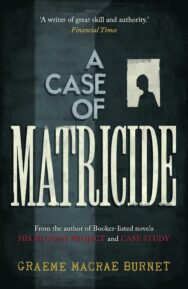A Q & A with Graeme Macrae Burnet
‘I’m fascinated by the drama that lurks behind everyday events, the tensions and resentments that arise in local bars or workplaces. That interests me just as much, if not more, than something violent or obviously dramatic like a murder.’
We are eagerly awaiting the final instalment of Graeme Macrae Burnet’s Inspector Gorski Mysteries, and so, to whet our appetite, we spoke to its author (and translator!)
A Case of Matricide
By Graeme Macrae Burnet
Published by Saraband
Hello Graeme, a hearty congrats for the publication of A Case of Matricide. Could you tell our readers a little bit of what to expect from the novel?
Thanks. A Case of Matricide is the final part of the Georges Gorksi trilogy, my sequence of crime novels set in the unremarkable French town on Saint-Louis. Here we find Gorski (the local chief of police) living with his aging mother and trying to untangle the connections between the appearance of a mysterious stranger in the town, a elderly woman who believes her son is trying to kill her and the death of a local factory owner. It feels quite action packed to me, but as with the other novels in the trilogy (The Disappearance of Adèle Bedeau and The Accident on the A35), my main interest is the impact these events have on the central characters. Oh, and there’s also a fair amount of boozing.
This is the last book in your Inspector Gorski Mysteries. How does it feel to say goodbye to a character and a place, Saint-Louis, when you’ve spent such a long time in their company?
I’ll definitely miss mentally inhabiting the streets and bars of Saint-Louis. And of course I’ve become very attached to the character of Georges Gorski, but this is definitely the time go our separate ways.
What drew you to small-town France as a setting for your crime fiction?
I’m fascinated by the drama that lurks behind everyday events, the tensions and resentments that arise in local bars or workplaces. That interests me just as much, if not more, than something violent or obviously dramatic like a murder. So I think I was drawn to Saint-Louis precisely because it seems like a place where nothing overtly dramatic would ever happen. Also I come from a small town myself, so perhaps Saint-Louis is a kind of surrogate for my feelings about these kind of places.
Georges Gorski is seen as a simple, undynamic man, but always has good instincts and character judgement. Did you want to say anything in particular about unshowy intelligence with his creation?
It’s probably true to say that Gorski is not very dynamic – in his police work, he certainly values procedure over flashes of inspiration or hunches – but I’m not sure I’d agree that he’s simple. Actually, I think he’s quite a complicated character, burdened by insecurities and guilt and regret about episodes in his past.
Your Gorski books always seem to explore characters that have difficulty in coming to terms with disappointments or inadequacy. What do you want to explore in coming back to these themes?
I never approach a piece of work with the idea of ‘exploring themes’. I try to inhabit the locales and characters and follow the trajectory that takes me on. If certain ‘themes’ arise or recur, they do so organically from this process rather than through any intention on my part.
You always have interesting framing devices in your novels, and with the Gorski mysteries you do this with the creation of the ‘author’ Raymond Brunet. Why do you like to do this?
It seems perfectly natural to me. I always find myself (as a reader) asking where did this text come from? Or, how do we have access to this characters thoughts? So, on the one hand, these devices are just a way of addressing such questions.
With regard to the Gorski novels and their author Raymond Brunet, with the first book I simply felt that what I was writing was a translation – the characters would have been speaking French to each other, and to a certain extent I was attempting to write in the style of a mid-twentieth century translation, using certain slightly archaic pieces of vocabulary to try to achieve this.
Having set this device in motion (that Raymond Brunet was the author of the books), I wrote The Accident on the A35 and A Case of Matricide very much from his point of view, expressing his worldview. The two books are fictionalised versions of events in his own life – a sort of metafictional autofiction.
Are we allowed to ask about what’s next for you as a writer? Do you think you would commit to another series of novels? Do you fancy tackling another genre?
I have a plan for a fairly hefty project that will take a big chunk of time to write, but I’m keeping it under wraps for the time being. I can’t see myself writing another trilogy, but who knows. I don’t really think beyond the next project.
What books have you enjoyed in 2024? What are you reading at the moment?
I just read Forbidden Notebook by Alba de Céspedes which is a masterpiece. I’ve had a sneak preview of Kate Summerscale’s The Peepshow. I love Summerscale’s work, and this re-examination of the 10 Rillington Place case is utterly fascinating. I also enjoyed David Greig’s Columba’s Bones, in Polygon’s Darklands series, which has the best opening chapter I’ve read in years!
A Case of Matricide by Graeme Macrae Burnet is published by Saraband, priced £14.99.
ALSO IN THIS ISSUE

 The Bridge Between Worlds by Gavin Francis
The Bridge Between Worlds by Gavin Francis
‘As a child reading my Ladybird books I marvelled at the power and possibilities of bridges, and eve …

 The Legacy of Arniston House by T.L. Huchu
The Legacy of Arniston House by T.L. Huchu
‘And then the screams start. Terror. I’ve never heard anyone cry out like this.’













